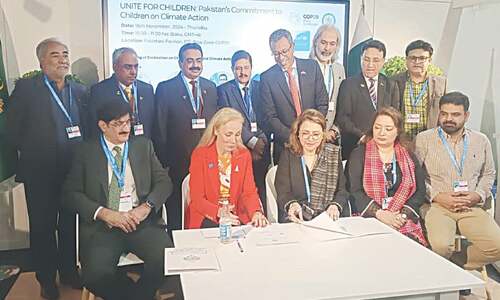HYDERABAD, Oct 21: University of Sindh Vice Chancellor Mazharul Haq Siddiqui has urged women councillors to help in promoting education in remote areas of the province.
He was speaking at the introductory ceremony of a four-day training workshop on gender-based governance system organized by the UNDP and the Centre for Rural Development Communication (CRDC), University of Sindh, for women councillors of union councils of Kotri taluka on Monday. About 35 women councillors from different union councils and nazims of union councils of Kotri taluka are participating in the workshop.
The vice-chancellor said that health and education were important sectors and women could play a key role in the development of these sectors, beginning from family to society.
He said that there was no doubt that a woman had great responsibility at home being wife, mother and sister and added that as a councillor she had additional responsibility to work for development of women of her area.
He said that women councillors in Sindh could play a vital role in education sector and added that by their frequent visits to schools, they could motivate stakeholders in the cause of education.
He said that education was an important pillar of development of a society and without education nothing could be achieved.
He advised the centre to arrange a visit of women councillors to the university so that they could see how girls were getting education and women teachers were performing their duties.
He asked the participants to take interest in the workshop, transfer their knowledge to other women and use the knowledge for development of their areas.
He said that the CRDC focused on women development as development without the participation of women was impossible. He expressed the hope that the CRDC would continue its efforts for rural development.
Director of the Centre Professor Ibadullah Rashid highlighted aims and objectives of the training workshop and said that CRDC had organized workshop to provide training to women councillors.
He said that it was a good sign that the UNDP had developed an excellent programme to train women councillors. He expressed the hope that women councillors would get benefit from the training.
UNDP Project Manager Abdul Fatah Tunio said that the UNDP had developed a training programme for women councillors which would continue up to year 2012.
He said that under the programme the UNDP in collaboration with the CRDC would provide training to 1,500 women councillors, nazims, naib nazims and government employees.
He said that during the last decade, the government had shown commitment to gender equality through the formulation of polices and programmes that aim to reduce gender disparity and ratification of a number of international conventions.
He said that in Pakistan, women’s situation vis-a-vis men was based on systemic subordination, determined by the forces of patriarchy across classes, regions and the rural-urban divide.
He said that development initiatives needed to take account of ground realties, in particular political situation in different areas of the country.
He said that gender-based governance system project was built on the lessons learnt from the women’s political school and gender mainstreaming through planning and development projects.
He said that the school focused on women councillors’ capacity enhancement and intended to institutionalize gender-based governance through capacity enhancement of women councillors and relevant training institutions.
Professor Dr Rajab Ali Memon and Professor Har Bux Makhejani, who are resource persons of the workshop, also expressed their views.














































Dear visitor, the comments section is undergoing an overhaul and will return soon.